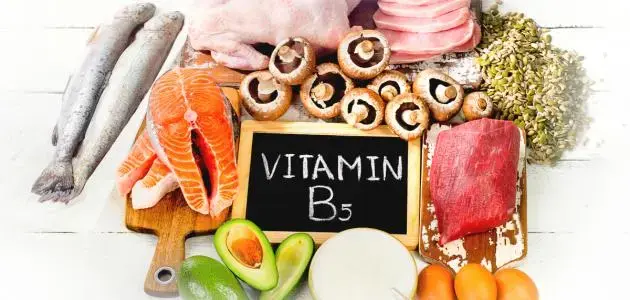Getting enough vitamin B5 is pretty easy if you eat a healthy, balanced diet every day. This vitamin shows up in lots of common foods, so adding it to your meals isn’t a big deal. Just a heads-up though—freezing and canning food can reduce the amount of vitamin B5, and even whole grains, which are a great source, lose between 35% to 75% of it during processing and refining.
Foods That Are Rich in Vitamin B5
Meats
- Chicken breast (skinless) – 100 grams gives you about 32% of your daily need.
- Beef – 100 grams covers around 27% of your daily value.
- Turkey
- Duck
- Organ meats like liver and kidneys
Seafood
- Salmon – 100 grams provides about 38% of your daily vitamin B5.
- Lobster
- Oysters
Grains
- Whole wheat bread
- Wheat germ
- Oats
Dairy
- Milk – One cup of low-fat or skim milk gives you 36% of your daily vitamin B5.
- Feta cheese – Half a cup contains about 0.7 mg of vitamin B5.
- Yogurt
- Eggs and egg yolks
Legumes
- Lentils – One cup provides 25% of the daily value.
- Peas – One cup gives 23% of your daily amount.
- Lima beans – One cup has 16% of your daily vitamin B5.
- Soybeans
Fruits and Vegetables
- Oranges – One orange has about 0.3 mg of vitamin B5.
- Shiitake mushrooms – One cooked cup covers 104% of the daily need.
- Avocado – One avocado provides 56% of your daily requirement.
- Sweet potatoes – One mashed cup offers 26% of your daily vitamin B5.
- Corn – One cup of sweet corn provides 24% of your daily needs.
- Broccoli
- Cauliflower
- Kale
- Tomatoes
Other Sources
- Sunflower seeds – 100 grams provide 141% of your daily vitamin B5.
- Nutritional yeast
- Peanuts
- Royal jelly
Quick Overview: What Is Vitamin B5?
Vitamin B5, also called pantothenic acid, is important for making blood cells and turning protein, carbs, and fats into energy. It helps keep your skin, hair, eyes, and digestive system healthy. It also plays a role in your nervous system and liver, and is involved in producing sex hormones and stress hormones made in your adrenal glands.
It’s a water-soluble vitamin and part of coenzyme A, which helps build and break down fatty acids. Vitamin B5 also helps with cholesterol, fat, neurotransmitters, steroid hormones, and hemoglobin production.
Benefits of Vitamin B5
Proven Benefits
- Fixing Vitamin B5 Deficiency: Taking vitamin B5 supplements can help treat or reduce the risk of deficiency.
Benefits Still Needing More Proof
- Sports Performance: Some vitamins help boost athletic performance, but the effect of vitamin B5 isn’t clear yet.
- ADHD: Mixed evidence on whether vitamin B5 combined with other vitamins helps with attention deficit hyperactivity disorder.
- Constipation: An older study showed a related compound (dexpanthenol) might help relieve constipation by stimulating muscle contractions in the digestive tract. It’s often used for constipation in pregnant women, kids, and seniors, but newer studies are needed.
- Osteoarthritis: Vitamin B5 supplements don’t seem to reduce symptoms of osteoarthritis.
- Post-Surgery Healing: Vitamin B5 might speed up wound healing and reduce stress and fatigue after surgery, based on animal studies.
- Rheumatoid Arthritis: Some early research suggests vitamin B5 might help ease symptoms, but more studies are needed.
Other Claims Without Enough Evidence
- Improving allergies
- Reducing hair loss and dandruff
- Helping with asthma
- Lowering risk of heart disease
- Helping with carpal tunnel syndrome
- Reducing lung disease risk
- Relieving colitis
- Helping with conjunctivitis
- Lowering kidney disease risk
- Reducing depression
- Helping diabetes-related issues
- Relieving headaches
- Boosting immune function
- Helping with hyperactivity
- Lowering blood pressure
- Reducing insomnia and irritability
- Lowering risk of multiple sclerosis
- Helping with muscular dystrophy and muscle cramps
Vitamin B5 Deficiency
Vitamin B5 deficiency is pretty rare and usually happens to people with poor nutrition. It rarely causes serious health problems because those with a deficiency often lack multiple vitamins.
Some people with skin issues like acne might have low vitamin B5. Symptoms of deficiency include irritability, dizziness, fast heartbeat, stomach pain, loss of appetite, constipation, numbness and tingling in hands and feet (called burning feet syndrome), overactive reflexes, and muscle weakness in fingers.
Recommended Daily Amounts of Vitamin B5
| Age Group | Recommended Amount (mg) |
|---|---|
| Birth to 6 months | 1.7 |
| 7-12 months | 1.8 |
| 1-3 years | 2 |
| 4-8 years | 3 |
| 9-13 years | 4 |
| 14-18 years | 5 |
| 19 years and older | 5 |
| Pregnant 14-18 years | 6 |
| Pregnant 19 years and older | 7 |
Leave a comment
Your email address will not be published. Required fields are marked *




